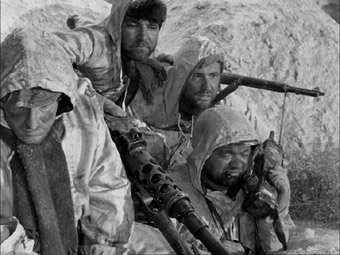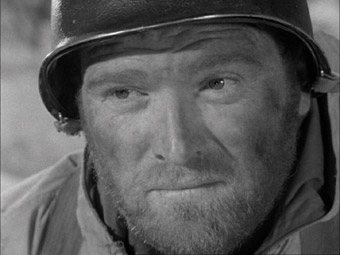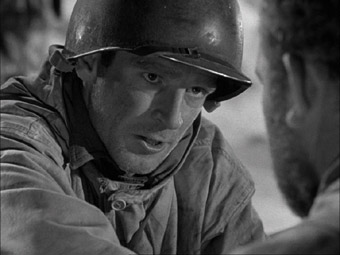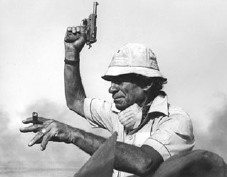|
The
first photograph I ever saw of Sam Fuller pictured him with
a cigar in one hand and an automatic pistol in the other,
which he was pointing skyward. He wasn't acting or indulging
in recreation, but directing. Word has it that instead of
shouting "Action" he would fire the pistol in
the air. It's the sort of story that cult legends are built on,
but in Fuller's case was almost definitely true. Fuller
was a genuinely larger than life character who lived up to the image most seem to have of him. And I'm talking
from first hand experience here.
Some years ago I had the genuine pleasure of attending an
interview with Fuller at the National Film Theatre to mark
the release of The Big Red One. It's a
fascinating experience to look back on, for at this time
the cult surrounding Fuller's work was barely large enough
to qualify as a cult at all, and the interview was so poorly
attended that those of us not seated right at the front
were encouraged to move forward so that the auditorium would
seem less empty. Just a few years later, the combined praise
of directors such as Martin Scorsese, Jim Jarmush and
Quentin Tarantino had prompted a major rediscovery of Fuller's
work, and the same event would have filled this sizeable
venue three times over.

One
of the things I'll always remember was Fuller's
entrance. There was none of the careful stage management
I'd witnessed at other such interviews – following a screening of the opening scene from
The Big Red One, the lights went up to
reveal Fuller, dressed in a loud shirt and, if I remember
correctly, holding his trademark cigar, standing halfway
down the central aisle and shouting back at those who had
directed him towards the stage "Where do I go? Down here?"
He answered questions directly, entertainingly and without
a hint of pretension. Asked what his idea of a good crew
was he replied "I tell them what I want, I go off, and
when I come back it's done!" Later, he listened patiently
to an interminably long question whose complexity bordered
on gibberish, then turned to his host and cried in exasperation
"What did he just say? I didn't understand what he
said!" How could you not love this man?
I'd
be willing to bet that Fixed Bayonets!
was one of the films where that pistol was fired to get
the actors moving. It's exactly the sort of film that helped
secure Fuller's reputation as a director of tough, well-told action movies whose technical handling and attention
to detail lifted them way above their sometimes B-movie
production values. And if you're looking for evidence of
Fuller's influence on Scorsese and his contemporaries, then
search no further. But I'll come to that. Fuller's stamp
is on a lot more that the camera movements and editing.
Fixed
Bayonets! starts with a textual salute to the US
Infantry that sets the story in 1951 Korea, then moves on
to live action to blow a jeep full of them off the road
and introduce us to a tent full of officers with a difficult decision to make. Their division is facing certain defeat
if they don't retreat, but actually doing so is not so simple.
If the enemy gets wind that they are on the run then they are likely
to attack in force. The
commander decides that they must leave one company of just 48
men as a rear guard, their job being to convince the opposing
forces that the entire division is still present while the
majority make their way to safety. One of those charged
to remain, reluctant corporal Denno (Richard Basehart),
has a deep rooted fear of command, but as those who outrank
him begin falling victim to enemy fire, the possibility
looms that he may have to take charge of the company.
It
may read like the setup for a standard story of finding
your inner hero in time of war, but even in that short synopsis
there are a couple of things that do not play by the war
movie manual. For a start, there's an up-front acknowledgement
that things did not always go well for US troops in this
particular conflict, that sometimes they were outgunned
and outmanoeuvred, and that standing and fighting to the
death was not always the logical option. This sort of cinematic
honesty has become a familiar ingredient of post-Vietnam
war movies, but it's important to remember that Fixed
Bayonets! was made and released in 1951, when American
troops were still fighting in Korea and still suffering
losses. And while the enemy forces are almost inevitably
referred to as either 'Reds' or 'Commies', this is honest
soldier speak rather than right-wing sermonising, and the
enemy soldiers are never caricatured or demonised, but instead shown
as a relentless but professional and potentially deadly
force to be reckoned with.

Although
the narrative arcs are built around Denno, he is just one
soldier in a distinctly drawn ensemble group that includes
a few genre staples, some of whom would only become
so in later years. The agitated Italians and the dryly
amusing intellectual Whitey would sit just as comfortably
in Fuller's 1980 The Big Red One, but just
how many war movie platoons can you think of that include
a Cherokee Indian? A
likeable and varied bunch, the soldiers' breezy interaction
is one of the film's real pleasures, and one that gives
it a surprisingly contemporary edge. This is echoed in Fuller's
direction, which takes advantage of the snowbound studio
set to repeatedly get Lucien Ballard's crane-mounted camera
on the move, covering entire sequences in single, highly
mobile and sometimes complex shots that are never
designed to draw attention to themselves.* Elsewhere, a combination
of Ballard's camera placement and Nick DeMaggio's editing
are combined to nail-biting effect, the sequence in which
Denno has to cross an ice-covered mine field to reach his
wounded superior being an object lesson in how to grind an audience into its seats. The use of facial close-ups to connect us with the
emotions and humanity of the platoon members – notably in
the remarkable sequence in which the rear guard watch silently
as their comrades slowly make their retreat – is up there
with the final sequence of Kubrick's Paths of Glory,
which Fuller's film predates by six years. The film even
anticipates some of the genre's later visual ticks, with
white flash frames used to emphasise artillery fire and
the camera itself shaken by the impact of the shell blasts.
That both were created in post-production is neither here
nor there.
Fuller
engages us with his characters by defining them quickly
and clearly and giving them interesting things to say and
do, and with the plight of the company as a whole by focussing
on the basics of survival rather than the politics of this
particular war, which the universality of the story renders
largely irrelevant. His no-nonsense approach to the violence
is sometimes startling, the ferocious fire-fights kicking
off without warning and explosions triggered so close to
the actors that I'd be amazed if there weren't on-set injuries
as a result. That Denno's boy-to-man journey is a little
predictable does not harm a film in which the surrounding
action is so involving, while the intermittent and largely
unnecessary dips into his thought processes are later rather neatly expanded to include the musings of all the surviving
company members and capped by an unexpected moment
of left-field comedy.
Widely
recognised as one of the essential Sam Fuller films (in
the recently reviewed Z
Channel: A Magnificent Obsession, it's one
of the two Fuller films that Quentin Tarantino ties himself
up in knots of frustration at the memory of not being able
to see), Fixed Bayonets! thoroughly deserves
both that reputation and the exclamation mark in its title.
Its combat is realistic and hard-hitting, its characters
engaging and its grip unwavering, while the dialogue and
performances manage a neat balancing act between naturalism and stylised-smart. There are a fair few equally qualified candidates,
but if you're looking for a film that defines just why Sam
Fuller is held in such high esteem by modern filmmakers,
then Fixed Bayonets! should definitely
be on the shortlist.
Framed
1.33:1, which is as close to dammit to the shooting ratio
of 1.37:1, this is another of those black and white films
from the 1950s that leaps to life on DVD, the spot-on contrast
and fine detail giving the greyscale images a richness that
VHS could only dream of. The print has also been impressively
cleaned up, and despite the film's age there's hardly a
dust spot or mark to be seen.

The
Dolby 2.0 mono sound is also rather good for its vintage,
displaying pleasing clarity and a not bad dynamic range.
None.
A shame.
Fixed
Bayonets! is a cracking early Fuller film, for
its character interplay and tensions, for its roving camerawork,
for the sheer tension of that iced minefield sequence, for
its vigorously staged action, and for its brisk storytelling.
It even gave James Dean his first, brief film role, though
you'll probably need a second viewing to spot him. Optimum's
disc is light on extras, but the price is good and if you are not
familiar with the cinema of Sam Fuller then this is a damned
fine place to start.
* I have no doubt that Fuller saw this as
a purely practical move to save time. When asked about the possible surrealist influence
on the shot of the statue of Christ with ants crawling over
its face in the opening sequence of The Big Red
One at the above mentioned
NFT interview, he replied "There were ants on it when
we got there and it looked interesting so we filmed it."
By the
way, here's that picture of Fuller that kicked off the review:

|